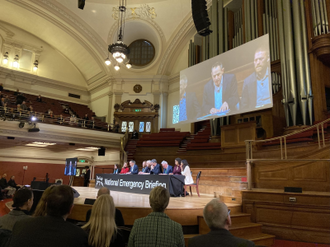National Emergency Climate Briefing

The Emergency Briefing at Methodist Central Hall
Today I joined more than a thousand other people in a packed Methodist Central Hall at the National Emergency Climate Briefing to listen to ten experts present their assessments of the current risks to the UK, and rest of the world, from the climate and nature crisis.
Every parliamentarian was invited to attend (and many did), along with leaders from business, the civil service, judiciary, health service, culture, media and advocacy groups. I was there in my capacity as a trustee of Faith for the Climate, together with Christian, Muslim, Buddhist, Hindu, Jewish and Baha'i colleagues, among others. On arrival, I was happy to catch up with Bishop John Arnold, the spokesman on the Environment for the Catholic Bishop's Conference of England and Wales, over coffee.
The opening remarks were given by TV presenter and naturalist, Chris Packham. Holding up a mobile phone with a picture of the earth as seen from space he said, "For those at the back, this is a picture of a small blue dot. For us, and all the other creatures on the earth, this is our home, and it is the only home we have. As far as we know, it is the only home to life in the universe and we are failing to look after it. They have just trashed COP30."
The failure of the recently concluded UN Climate Conference to come to any meaningful consensus was picked up by other speakers. There were 1,600 fossil fuel lobbyists at COP30 in Belem, Brazil, observed Professor Hayley Fowler, an expert on weather extremes, and it was notable that their influence resulted in the words 'fossil fuels' being removed from the text of the final document. Manchester University Professor of Climate and Energy, Kevin Anderson, looked back with regret to COP21, lamenting that the first target agreed in Paris 2015, that of restricting average temperature rises to 1.5°C, was already gone, while keeping below the 'dangerous' threshold of 2°C is looking increasingly unlikely and we are still on course for the 'unthinkable' 3°C rise by the end of the twenty-first century. There is no way now, he said, to avoid non-radical solutions. Either we step up with an organised transition away from greenhouse gas emissions, or we experience revolutionary violence and chaos.
Nathalie Seddon, Professor of Biodiversity at the University of Oxford, softened the blow by reminding us that the solution is on our doorstep. "Nature is critical national infrastructure", she said, and should be protected as such. Economist Angela Francis, also gave us encouragement, stressing that we have to change the rules of the game to ensure that sustainable environmental policies are rewarded and destructive practices made unviable. "It is government's job to change the rules", she said, speaking directly to the politicians in the room. She lamented that war, especially Russia's invasion of Ukraine, had made oil profitable again. Retired General Richard Nugee similarly agreed that "Peace and addressing the climate are two sides of the same coin," and argued that threats from climate impacts on national security could not be set aside for other emergencies, something that is recognised within the MoD. "Climate change can be thought of as a threat multiplier - making existing threats worse and creating new threats." He told the sobering story that while fighting in fierce summer heat in Iraq there were no deaths from the enemy out of his battle group of 1,000 personnel, but five had to be returned to the UK with heatstroke and 250 required treatment with drips.
In his final summing up, the Chair of the Briefing, Professor Mike Berners-Lee, noted that misinformation has plagued our national and international response to the climate crisis over many years and he appealed to the media to do better, saying "We are not safe" and "This is an emergency." A public letter has been drafted by the organisers of the Briefing to Sir Keir Starmer and all the Public Service Broadcasters, calling for a National Emergency Briefing for the public at large, to deliver on their mandate and ensure that the population is fully informed on the facts and able to 'listen to the science.'
Amid an uncomfortable morning listening to these difficult and gloomy messages, a note of hope stood out for me in the words of Tessa Khan, the founder and Executive Director of Uplift, an organisation that works towards a just transition away from oil and gas in the UK. She pointed out that the jobs created in a just transition to cleaner forms of energy will be around for a long time - and so will the governments that back them.
The National Emergency Briefing left me more aware than ever that there is plenty of work still to do if we are to protect this precious 'blue dot', our only home, the earth. I feel fortunate, however, to be already immersed in this work together with many colleagues from a multitude of different faiths, all engaged in bringing to bear the spiritual resources of our respective traditions to move hearts and minds towards this common, shared task. We will need our leaders in government, business, and media to make the big, brave decisions that turn our concerns into real world solutions, but each and every person of faith has an undeniable contribution to make in helping them to get there.
Colette Joyce is the former Justice and Peace Co-ordinator for the Diocese of Westminster (2020-2025) and a trustee of Faith for the Climate.


















